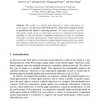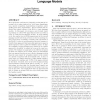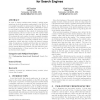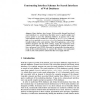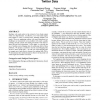85 search results - page 4 / 17 » The impact of crawl policy on web search effectiveness |
GCC
2005
Springer
13 years 10 months ago
2005
Springer
Web spider is a widely used approach to obtain information for search engines. As the size of the Web grows, it becomes a natural choice to parallelize the spider’s crawling proc...
CIKM
2011
Springer
12 years 5 months ago
2011
Springer
Word prediction performed by language models has an important role in many tasks as e.g. word sense disambiguation, speech recognition, hand-writing recognition, query spelling an...
WWW
2009
ACM
14 years 5 months ago
2009
ACM
In order to return relevant search results, a search engine must keep its local repository synchronized to the Web, but it is usually impossible to attain perfect freshness. Hence...
WISE
2005
Springer
13 years 10 months ago
2005
Springer
Many databases have become Web-accessible through form-based search interfaces (i.e., search forms) that allow users to specify complex and precise queries to access the underlying...
WWW
2010
ACM
13 years 9 months ago
2010
ACM
Realtime web search refers to the retrieval of very fresh content which is in high demand. An effective portal web search engine must support a variety of search needs, including ...
